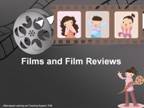Suggested Follow-up Activities
Learners' possible problem(s) (for reference only)
- Learners are not able to apply simple reference skills to obtain information about the reading material from the blurbs, glossaries, book covers, tables of content and other resources.
- Learners are not able to apply simple reference skills to locate information in materials like price lists, maps, menus, webpages, charts and directories.
- Learners are not able to apply simple reference skills to use picture dictionaries or word books to check meaning and spelling.
Suggested Follow-up Activities
| Learning Unit | Description | Problem addressed (see above) | Suggested duration (minutes) | For Students' Self-access |
|---|---|---|---|---|
Films and Film Reviews
 |
By participating in the activities to select the most interested movie for class viewing, learners understand the features of survey reports and learn how to write a survey report. While watching the film, learners learn to predict information to help understand the film content. They also learn to write a film review. Related Module: Happy Days |
 |
395 |  |
Discover Hong Kong (Hong Kong Adventure 1)
 |
Learners learn about the use of compound words and tourist spots in Hong Kong through participating in reading and speaking activities. Supplementary writing activity and card game provide further practice for learners. Learners consolidate their knowledge of compounding through their participation in Susan’s treasure hunt! Related Module: We Love Hong Kong |
    |
95 |  |
An Unlucky Day (Hong Kong Adventure 2)
 |
Learners identify the use of prefixes through reading and writing activities. By showing non-examples, learners understand not all the words starting with these letters are prefixed words. Learners consolidate their knowledge of prefixes through their participation in Susan’s treasure hunt! Related Module: We Love Hong Kong |
  |
75 |  |
A Day on Cheung Chau Island (Hong Kong Adventure 3)
 |
Learners identify the use of suffixes in reading photo captions and playing riddles. They understand how to use suffixes to form words to describe people or objects that do something. Learners consolidate their knowledge of suffixes through their participation in Susan’s treasure hunt! Related Module: We Love Hong Kong |
  |
50 |  |
Treasure Hunt (Hong Kong Adventure 4)
 |
Learners learn about compound words, prefixes and suffixes while helping Susan and her friends to locate the treasure. With story and practice mode, learners can decide what and when to learn. Related Module: We Love Hong Kong |
  |
30 |  |
I Love China
 |
Learners learn how to find different resources related to China from the Internet, books, newspapers and realia in their surrounding environment. They can develop their vocabulary, reference, library and information skills Related Module: We Love Hong Kong |
  |
- |  |
| Super Word Kid 1 - Library Break  2 - Comic Freeze  |
Learners learn how to find different resources related to China from the Internet, books, newspapers and realia in their surrounding environment. They can develop their vocabulary, reference, library and information skills Related Module: We Love Hong Kong |
  |
85 |  |
Other Resources
Teachers may refer to the following resources or experiences for further information in planning and preparing their learning and teaching activities:
- Education Bureau, HKSARG
English Language Education Section, Curriculum Development Institute
References and Resources
http://www.edb.gov.hk/index.aspx?langno=1&nodeID=2773 - Educational Television Programmes
Resources
Teacher Resource Programmes - Phonics Series
http://etv.edb.gov.hk/index-e.asp - HKedCity
Learning Centre > Subject i-World > Primary English > Shared Resources > Vocabulary
http://www.hkedcity.net/iworld/resource/index.phtml?iworld_id=45&parent_id=1346 - Learning Centre > Subject i-World > Primary English > Shared Resources > Resources Library
http://www.hkedcity.net/iworld/resource/index.phtml?iworld_id=45&parent_id=1340 - Dave’s ESL Cafe
http://www.eslcafe.com/ - Semantic Rhyming Dictionary
http://www.rhymezone.com/
| Title | Abstract | Remarks |
|---|---|---|
| The Research Project on the Development of Learning, Teaching and Assessment Materials of English Language to Enhance Effective Learning Teaching in Primary Schools |
The research project aims to provide school-based support to participating schools in strengthening their students’ vocabulary learning, reading and writing skills, through offering intensive, onsite and school-based professional support including professional development activities, collaborative school-based learning and teaching material development, as well as research. |
Related Materials: Other key learning objectives |
| The Research Project on Building Online Assessment Resources to Empower Both Frontline Professionals and Students: Connecting Reading and Writing across Key Stages 1 to 2 (ELE) |
The research project aims at investigating and developing effective approaches to enhance online assessment and developing e-assessment packages (including the provision of feedback and LT materials) for connecting reading and writing at primary level. |
Related Skills: KS1 Reading KS1 Writing (*All reading tasks are |
| Study of Using Assessment Data to Enhance Learning and Teaching (English Language Education) Phase I — Analyzing Multiple Choice Items in the 2008 TSA Reading papers for Primary 3, Primary 6 and Secondary 3 |
This document reports an analysis into a set of 2008 Territory-wide System Assessment (TSA) reading papers, students' performances and the facility indices. The objective of this work is to identify students’ learning problems, and the dimensions in which weaknesses in students’ performance are manifest. It is hoped the identification of these learning problems will lead to reliable and accurate estimates of possible causes of prospective students’ learning problems, resulting in the development of some school-based diagnostic assessment tools, the outcomes of which will inform future teaching and learning. |
Related Skill(s) and BC(s):
KS1 Reading:
KS2 Reading:
KS3 Reading: |
| Study of Using Assessment Data to Enhance Learning and Teaching (English Language Education) Phase II |
The objectives of this Study aree to i) empirically verify some students’ key reading problems observed in the Phase-I Study; ii) ascertain causes of reading difficulties for the students while they were reading; and iii) make use of what has been observed from the tests and interviews data to inform and enhance the teaching and learning of reading in the pilot schools. Findings of the Study have implications for the teaching of reading in both primary and secondary schools, and especially in teaching students reading skills which may enhance their performance in reading, with specific reference to the Territory-wide System Assessment (TSA) reading papers. |
Related Skill(s) and BC(s):
KS1 Reading:
KS2 Reading:
KS3 Reading: |
| Moving forward with schools – A Report on the Research and Development Project in Two Primary Schools to Enhance the Learning and Teaching of Reading (TSA) |
This document reports the implementation and findings of the research and development project, which have drawn on findings in Phase I and II of the Study, conducted at the Primary Six level in two primary schools. The objectives of the Study are to i) explore together with the teachers, in the context of teaching and learning in the schools and making use of assessment data (including TSA data), to identify specific learning and teaching needs of their Primary Six students, particularly the learning effectiveness of the low achievers; ii) report and develop the good practices of the teachers in participating schools; and iii) to identify successful strategies for the considerations of teachers in other schools to adopt or adapt in their own school contexts. |
Related Skill(s) and BC(s):
KS2 Reading: |

